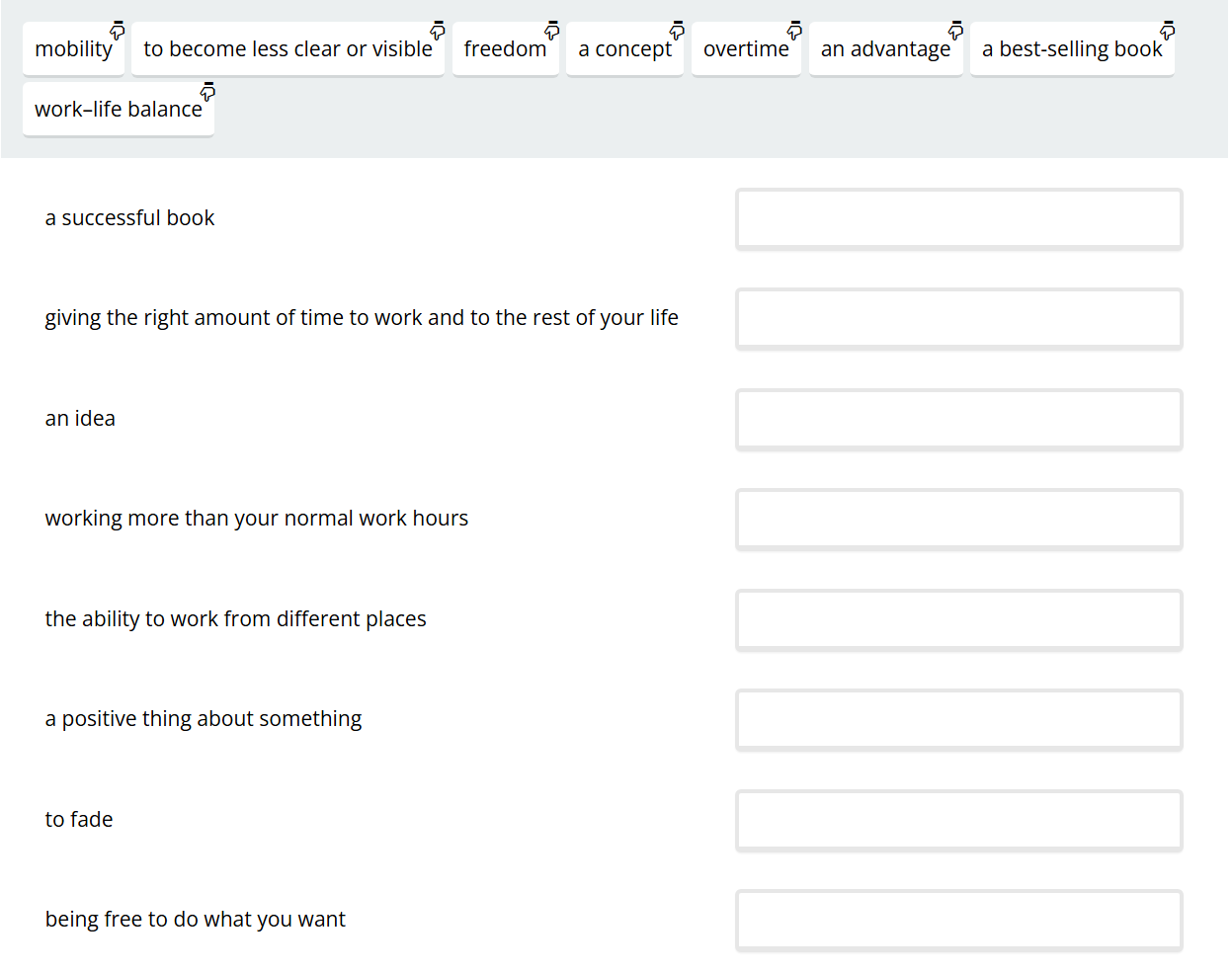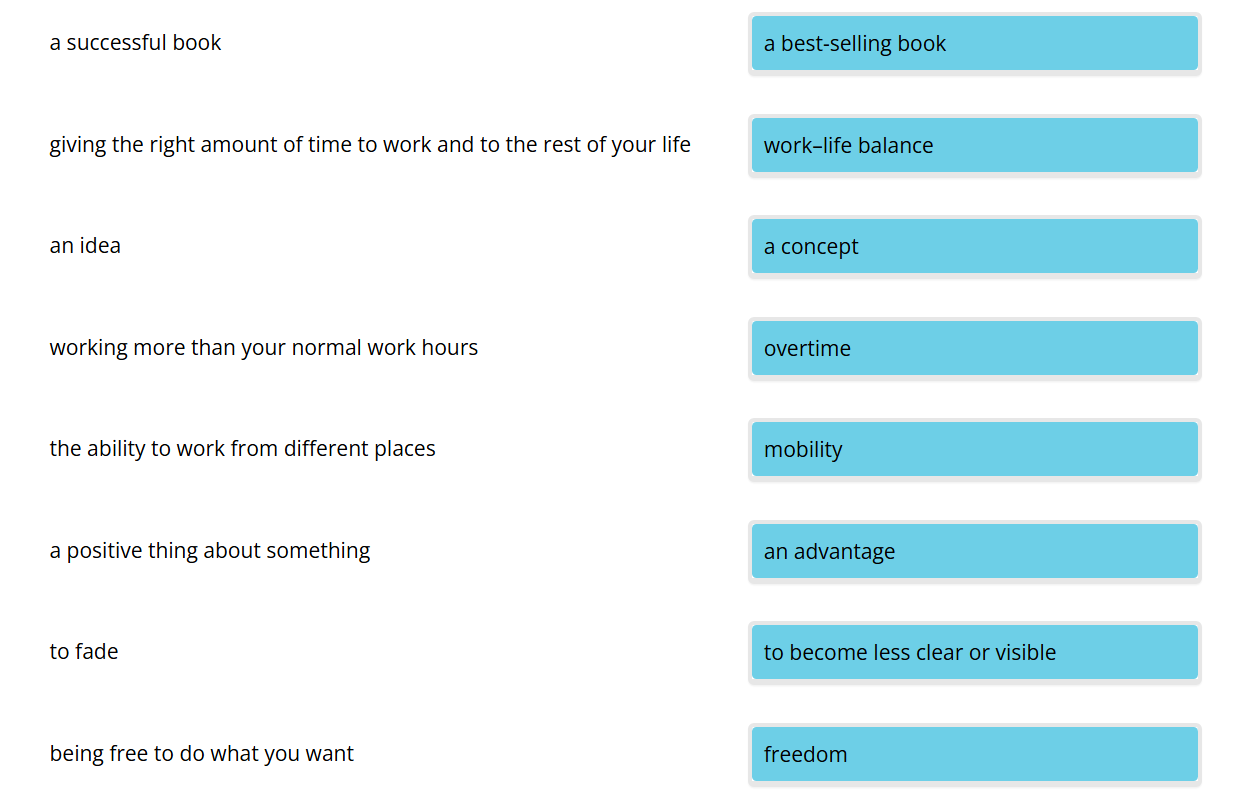【B1-Listening】12 Work–life balance-工作与生活的平衡
【B1-Listening】12 Work–life balance-工作与生活的平衡

Listen to a radio interview about maintaining a good work–life balance to practise and improve your listening skills.
收听关于保持良好的工作与生活平衡的广播采访,以练习和提高您的听力技巧。
Do the preparation task first. Then listen to the audio and do the exercises.
先做好准备工作。然后听音频并做练习。
Preparation准备
Listen to the English teacher talk about listening to practise and improve your listening skills.
听英语老师讲听力练习,提高你的听力技巧。
Do the preparation task first. Then listen to the audio and do the exercises.
先做好准备工作。然后听音频并做练习。
Work–life balance – preparation
Match the words with the definitions.
- Question
Vocabulary
1.throughout
2.isolated
3.a patch
4.drizzle
5.to clear up
6.elsewhere
7.a heatwave
8.to make way for
Definition
a. a small area
b. to disappear
c. on its own, without other similar things around it
d. during all of a period of time
e. in other places
f. to move so that there is space for something to enter
g. very light rain
h. a period of weather that is much hotter than normal

- Answer
1.a small area – a patch
2.to disappear – to clear up
3.on its own, without other similar things around it – isolated
4.during all of a period of time – throughout
5.in other places – elsewhere
6.to move so that there is space for something to enter – to make way for
7.very light rain – drizzle
8.a period of weather that is much hotter than normal – a heatwave
TODO

Transcript
English
Presenter: Good morning, everyone. On today’s show, we’ve got Chris Svensson with us, the author of No more nine to five, the new best-selling book about work–life balance in the current working world. Good morning, Chris. Thanks for coming.
Chris: Thanks for having me, Anna.
Presenter: So, Chris, tell us about your book and how the concept of a work–life balance has been changing?
Chris: Well, in the more traditional workplaces, people’s working lives and their private lives are, or were, clearly divided. People often work from nine in the morning until five or six in the evening. People sometimes stay late in the office and work in the evenings. This is called working overtime.
Presenter: OK, and what else?
Chris: Well, in these environments it isn’t common for people to work at the weekend or while they’re on holiday. They can clearly separate their working lives and their private lives. And the evenings, weekends and holidays are free to focus on non-work areas of life, such as hobbies, interests, sports, spending time with the family and friends, and so on. It’s important and healthy not to spend all your time just working, right?
Presenter: Right! So what has changed? How are things different now?
Chris: Well, for a start, most people can now access their work emails from their mobile phones. So they are more likely to quickly reply to an important mail in the evening or at the weekend. The same goes for laptops. It’s easier to access your work in the evenings from home or even from your hotel when you’re on holiday.
Presenter: That doesn’t sound like much of a work–life balance. It sounds like all work.
Chris: Exactly, but this new mobility brings a lot of advantages with it. More people are now able to work flexibly, so if they need to leave the office early one afternoon to be with their family, they can catch up on work that evening from home or somewhere else.
Presenter: That sounds good. So, what you’re saying is that although traditional divisions between work and life are fading, many employees now have more freedom to do their work from different locations and at different times.
Chris: Yes, that’s it.
English-Chinese
Presenter: Good morning, everyone. On today’s show, we’ve got Chris Svensson with us, the author of No more nine to five, the new best-selling book about work–life balance in the current working world. Good morning, Chris. Thanks for coming.
主持人:大家早上好。在今天的节目中,我们邀请到了克里斯·斯文森 (Chris Svensson),他是《不再朝九晚五》的作者,这是一本关于当前职场中工作与生活平衡的新畅销书。早上好,克里斯。 感谢你的到来。Chris: Thanks for having me, Anna.克里斯:谢谢你邀请我,安娜。
Presenter: So, Chris, tell us about your book and how the concept of a work–life balance has been changing?
主持人:克里斯,请告诉我们您的书以及工作与生活平衡的概念是如何变化的?Chris: Well, in the more traditional workplaces, people’s working lives and their private lives are, or were, clearly divided. People often work from nine in the morning until five or six in the evening. People sometimes stay late in the office and work in the evenings. This is called working overtime.
克里斯:嗯,在更传统的工作场所,人们的工作生活和私人生活现在或曾经是明确划分的。人们经常从早上九点工作到晚上五六点。人们有时会在办公室待到很晚并在晚上工作。这就是所谓的加班。Presenter: OK, and what else?主持人:好的,还有什么?
Chris: Well, in these environments it isn’t common for people to work at the weekend or while they’re on holiday. They can clearly separate their working lives and their private lives. And the evenings, weekends and holidays are free to focus on non-work areas of life, such as hobbies, interests, sports, spending time with the family and friends, and so on. It’s important and healthy not to spend all your time just working, right?
克里斯:嗯,在这些环境中,人们在周末或度假时工作并不常见。他们可以清楚地区分工作生活和私人生活。晚上、周末和节假日可以自由地专注于非工作的生活领域,例如爱好、兴趣、运动、与家人和朋友共度时光等等。不要把所有时间都花在工作上,这很重要也很健康,对吧?Presenter: Right! So what has changed? How are things different now?
主持人:对啊!那么发生了什么变化呢?现在情况有何不同?Chris: Well, for a start, most people can now access their work emails from their mobile phones. So they are more likely to quickly reply to an important mail in the evening or at the weekend. The same goes for laptops. It’s easier to access your work in the evenings from home or even from your hotel when you’re on holiday.
克里斯:首先,大多数人现在可以通过手机访问工作电子邮件。因此,他们更有可能在晚上或周末快速回复重要邮件。笔记本电脑也是如此。晚上在家甚至度假时从酒店也可以更轻松地完成工作。Presenter: That doesn’t sound like much of a work–life balance. It sounds like all work.
主持人:这听起来不太像是工作与生活的平衡。听起来像是所有工作。Chris: Exactly, but this new mobility brings a lot of advantages with it. More people are now able to work flexibly, so if they need to leave the office early one afternoon to be with their family, they can catch up on work that evening from home or somewhere else.
克里斯:没错,但是这种新的移动性带来了很多优势。现在,越来越多的人能够灵活工作,因此,如果他们需要在下午早点离开办公室与家人团聚,他们可以在家里或其他地方赶上当天晚上的工作。Presenter: That sounds good. So, what you’re saying is that although traditional divisions between work and life are fading, many employees now have more freedom to do their work from different locations and at different times.
主持人:听起来不错。所以,你的意思是,尽管工作和生活之间的传统界限正在消失,但许多员工现在有更多的自由,可以在不同的地点和不同的时间完成工作。Chris: Yes, that’s it.克里斯:是的,就是这样。
Task1
Listening B1: Work–life balance – 1
Choose the best answer.
- Question
- How popular is Chris Svensson’s book?
a. Not very popular
b. Very popular
c. It’s new. People don’t know it yet.- What is the work–life balance like in traditional workplaces?
a. Work lives and private lives are clearly divided.
b. People work too much overtime and so they have no private life.
c. People are free to manage the balance themselves.- How often do people do overtime?
a. Often
b. Sometimes
c. They don’t.- In traditional workplaces, do people work at weekends or when on holiday?
a. Yes, it’s normal.
b. No, never.
c. Usually, they don’t.- How has technology helped people work with more flexibility?
a. They can send and receive emails from their phones from home.
b. Their working hours can be easily tracked.
c. Robots can do their work for them.- Traditional divisions between work and life are fading. What does this mean for employees?
a. Everyone has to do overtime, all the time.
b. People have to work while they’re on holiday.
c. They can be flexible to work when and where it suits them.
- Answer
- How popular is Chris Svensson’s book?
a. Not very popular
✔b. Very popular
c. It’s new. People don’t know it yet.- What is the work–life balance like in traditional workplaces?
✔a. Work lives and private lives are clearly divided.
b. People work too much overtime and so they have no private life.
c. People are free to manage the balance themselves.- How often do people do overtime?
a. Often
✔b. Sometimes
c. They don’t.- In traditional workplaces, do people work at weekends or when on holiday?
a. Yes, it’s normal.
b. No, never.
✔c. Usually, they don’t.- How has technology helped people work with more flexibility?
✔a. They can send and receive emails from their phones from home.
b. Their working hours can be easily tracked.
c. Robots can do their work for them.- Traditional divisions between work and life are fading. What does this mean for employees?
a. Everyone has to do overtime, all the time.
b. People have to work while they’re on holiday.
✔c. They can be flexible to work when and where it suits them.
Task2
Listening B1: Work–life balance – 2
Put the ideas in the correct group.
- Question
- It will start raining at lunchtime today in the east.
True False- The weather in the north-west will be worse than in the south.
True False- There will be thunder in Leeds tonight.
True False- Most of England will be hot this week.
True False- Wet weather will move from the north to the south at the weekend.
True False- It will stay hot when the rain comes.
True False

- Answer
- It will start raining at lunchtime today in the east.
True ✔False- The weather in the north-west will be worse than in the south.
✔True False- There will be thunder in Leeds tonight.
True ✔False- Most of England will be hot this week.
✔True False- Wet weather will move from the north to the south at the weekend.
✔True False- It will stay hot when the rain comes.
True ✔False
- 今天午餐时间东部地区将开始下雨。
正确 ✔错误- 西北地区的天气会比南方更糟糕。
✔正确 错误- 今晚利兹将有雷声。
正确 ✔错误- 本周英格兰大部分地区将会很热。
✔正确 错误- 周末,潮湿天气将从北方转移到南方。
✔正确 错误- 下雨时天气会很热。
正确 ✔错误

Discussion
What do you do to help with listening? 你会做什么来提高听力?
Vocabulary
shower
- 简易
英/ˈʃaʊə(r)/美/ˈʃaʊər/
n.淋浴器,花洒;淋浴间,淋浴室;淋浴,洗澡;阵雨,阵雪;(落下的东西)一大批,一阵; 流星雨;<美>(为即将结婚或分娩的女子举行的)送礼聚会;<英,非正式> 一群乌合之众,一群笨蛋v.淋浴,洗澡;洒落,(使)纷纷降落;朝……阵雨般地扔(大量小东西)(shower sb. with);大量给予,慷慨给予
初中 | 高中 | CET4 | CET6 | 考研 | TOEFL | 商务英语
复数showers第三人称单数showers现在分词showering过去式showered过去分词showered - 《柯林斯英汉双解大词典》
shower/ˈʃaʊə/|CET4 TEM4
showering showered showers- N-COUNT A shower is a device for washing yourself. It consists of a pipe which ends in a flat cover with a lot of holes in it so that water comes out in a spray. 淋浴器
• She heard him turn on the shower.
她听见他拧开了淋浴器。
- N-COUNT A shower is a device for washing yourself. It consists of a pipe which ends in a flat cover with a lot of holes in it so that water comes out in a spray. 淋浴器
N-COUNT A shower is a small enclosed area containing a shower. 淋浴间
• Do you sing in the shower?
你在淋浴间里唱歌吗?N-COUNT The showers or the shower in a place such as a gym is the area containing showers. (体育馆等的) 浴室
• The showers are a mess.
那些浴室一片狼藉。N-COUNT If you take a shower, you wash yourself by standing under a spray of water from a shower. 淋浴
• I think I’ll take a shower before dinner.
我想晚饭前我要来次淋浴。V-I If you shower, you wash yourself by standing under a spray of water from a shower. 洗澡
• There wasn’t time to shower or change clothes.
没时间洗澡或换衣服了。N-COUNT A shower is a short period of rain, especially light rain. 阵雨
• There’ll be bright or sunny spells and scattered showers this afternoon.
今天下午将放晴,间有零星阵雨。N-COUNT You can refer to a lot of things that are falling as a shower of them. 大量下落
• Showers of sparks flew in all directions.
无数火星儿向四处飞溅。V-T If you are showered with a lot of small objects or pieces, they are scattered over you. 抛撒
• They were showered with rice in the traditional manner.
人们按照传统习俗朝他们抛撒大米。N-COUNT A shower is a party or celebration at which the guests bring gifts. 送礼会
• …a baby shower.
…为婴儿举行的送礼会。N a derogatory term applied to a person or group, esp to a group considered as being slack, untidy, etc 懒散邋遢鬼
N a large number of particles formed by the collision of a cosmic-ray particle with a particle in the atmosphere 镞射粒子
shower/ˈʃəʊə/
N a person or thing that shows 演出者; 展示物品
lunchtime
- 简易
英/ˈlʌntʃtaɪm/美/ˈlʌntʃtaɪm/
n.午餐时间复数lunchtimes
- 《柯林斯英汉双解大词典》
lunchtime/ˈlʌntʃtaɪm/
N-VAR Lunchtime is the period of the day when people have their lunch. 午餐时间
• Could we meet at lunchtime?
我们能在午餐时间见个面吗?
drizzle
- 简易
英/ˈdrɪz(ə)l/美/ˈdrɪz(ə)l/
v.下毛毛雨,下蒙蒙细雨; (毛毛雨似的)洒落;(毛毛雨似的)洒落n.毛毛细雨,蒙蒙细雨;(烹)(浇在食品上的)液态调料细流
GRE | GMAT
第三人称单数drizzles现在分词drizzling过去式drizzled过去分词drizzled
- 《柯林斯英汉双解大词典》
drizzle/ˈdrɪzəl/|CET6+ TEM4
drizzling drizzled drizzles
N-UNCOUNT Drizzle is light rain falling in fine drops. 毛毛雨
• The drizzle had now stopped and the sun was breaking through.
细雨已经停了,太阳露出了脸。V-I If it is drizzling, it is raining very lightly. 下毛毛雨
• Clouds had come down and it was starting to drizzle.
云压了下来,开始下起了毛毛雨。
foggy
- 简易
英/ˈfɒɡi/美/ˈfɑːɡi/
adj.有雾的,雾气茫茫的;迷糊的,朦胧的;模糊的,糊涂的高中 | CET4 | CET6 | SAT
比较级foggier最高级foggiest
- 《柯林斯英汉双解大词典》
foggy/ˈfɒɡɪ/|CET4 TEM4
foggier foggiest
ADJ When it is foggy, there is fog. 有雾的
• It’s quite foggy now.
现在雾很大。PHRASE If you say that you haven’t the foggiest or you haven’t the foggiest idea, you are emphasizing that you do not know something. 压根儿不知道
• I did not have the foggiest idea what he meant.
我压根儿不知道他是什么意思。
coast
- 简易
英/kəʊst/美/koʊst/
n.海岸,海滨;(车辆的)滑行v.(人,车辆)滑行;毫不费力地做,(尤指)轻松获胜;不够努力,应付;沿海航行
【名】 (Coast)(英、美)科斯特(人名)
初中 | 高中 | CET4 | CET6 | 考研
复数coasts第三人称单数coasts现在分词coasting过去式coasted过去分词coasted
- 《柯林斯英汉双解大词典》
coast/kəʊst/|CET4 TEM4
coasting coasted coasts
N-COUNT The coast is an area of land that is next to the sea. 海岸
• Campsites are usually situated along the coast, close to beaches.
宿营地通常都在海岸边,靠近沙滩的地方。V-I If a vehicle coasts somewhere, it continues to move there with the motor switched off, or without being pushed or pedalled. (车辆的) 惯性滑行
• He pushed in the clutch and coasted to a halt.
他踩下离合器,滑行了一会儿便停下来了。